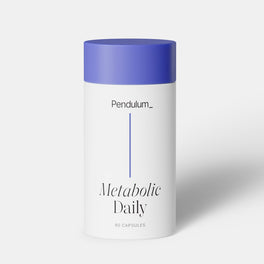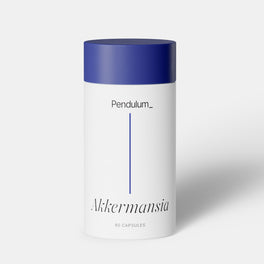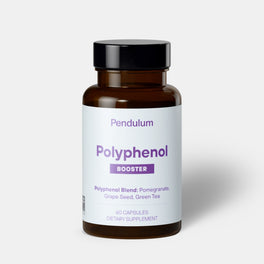Looks like your
cart is empty

Metabolic Daily
Improve metabolism

Akkermansia
Improves gut health

Polyphenol Booster
Increase antioxidants to protect cells
Stay in touch about special discounts, nutrition tips and additional education.
Looks like your
cart is empty

Improve metabolism

Improves gut health

Increase antioxidants to protect cells
Gut health and probiotics go hand in hand. This powerful duo seemingly pops up on every supplement label, functional food package, and wellnessy caption on your feed. But they’re more than buzzwords. Probiotics are essential for keeping your gut functioning at its best and supporting whole-body wellness. Keep reading to learn how.
Your gut is a long, twisting tube that stretches from your mouth to your anus, and is about 30 feet (equivalent to the height of a 3 story building) long from start to finish. And a lot happens along the way. When functioning properly, your gut plays a vital role in nearly every aspect of health, such as digestion, immune function, metabolism, skin health, hormone balance, vaginal health, fertility, longevity, and your mental health. That’s a lot of responsibility for one system.
Supporting this system are trillions of microorganisms that live throughout your gut. Among them are probiotics—beneficial bacteria that can make a major difference in how your gut (and the rest of your body) feels and functions. That’s why, if you struggle with gut issues, you might feel it every day, from persistent bloating and gas to slow digestion to strange, uncomfortable cramps after eating certain foods.
In this article, we’ll explore how probiotics support a healthy gut, which strains are most effective, and how to choose the right one for your unique needs.
Probiotics are living microorganisms (bacteria and yeast) that provide health benefits when consumed in adequate amounts. These “good bacteria” support various bodily systems and physiological functions including your immune response, mood, vaginal health, and produce substances that help regulate hormones, blood sugar levels, cardiovascular health, and appetite.
Maintaining a balanced gut with enough probiotics supports overall health, while an imbalanced gut, known as dysbiosis, can affect the whole body and lead to uncomfortable symptoms. Regularly getting probiotics from foods or supplements is a reliable way to support gut health. The best food-based sources are fermented foods, which contain live cultures, or microorganisms, including:
However, probiotic-rich foods typically only contain a few probiotic strains and often in lower amounts. This is why probiotic supplements can be helpful, as they offer a broader range of bacterial diversity. You can also look for a product that supports your specific health needs with clinically-validated strains.
A healthy gut can have a powerful ripple effect throughout your entire body. That’s where probiotics come in. “Probiotics improve gut health through a variety of mechanisms, each of which is strain-specific,” says Christina O'Connor, RD, Registered Dietitian at Pendulum Therapeutics. These trillions of beneficial bacteria each serve unique functions in maintaining balance and promoting overall health.
To get the most out of a supplement, choose one that provides probiotic strains that align with your health goals.
Several probiotic strains can help restore balance to the microbiome and keep digestion and gut health on track. Here are some of the most common strains found in supplements.
Before diving into the ways probiotics support gut health, it's important to understand what a healthy gut actually is and how it makes you feel. A healthy gut:

When your gut health is in order, that supports healthy immune function. You may also feel some noticeable benefits, including regular bowel movements, minimal gas, bloating, or other digestive discomfort, and more stable and steady energy levels and appetite.

Certain factors can disrupt a healthy gut and throw your gut out of balance, and antibiotics are a major one. While they’re essential for fighting bacterial infections, antibiotics don’t discriminate between harmful and beneficial bacteria. “Your gut microbiome can become imbalanced after antibiotics, where beneficial bacteria are reduced and harmful ones overgrow,” says Alyssa Wilson, MS, RD, Registered Dietitian at Pendulum Therapeutics.
To help restore balance, certain probiotic strains are particularly effective after a course of antibiotics:
If you're rushing to the bathroom with soft, watery stools, certain probiotic strains may offer relief. “Lactobacillus rhamnosus GG (LGG) reduces duration and severity associated with travelers' diarrhea, antibiotic-associated diarrhea, and infectious diarrhea, especially in children,” says Wilson. “Saccharomyces boulardii, a yeast-based probiotic may be helpful for individuals with recurrent Clostridium difficile infections, antibiotic-associated diarrhea, and travelers' diarrhea.”
Additionally, a double-blind, randomized, placebo-controlled trial found that Bifidobacterium lactis CCT 7858 may help ease soft stools and reduce gastrointestinal symptoms like abdominal discomfort, bloating, and diarrhea in people on antibiotic treatment.
The gut lining is a mucosal membrane made up of epithelial cells, a mucin layer, and immune cells. It acts as a barrier to block harmful substances (toxins, pathogens, bacteria, partially digested food particles) from entering the bloodstream and causing damage.
A weakened gut lining becomes permeable, allowing these harmful substances to pass into the bloodstream. This condition is known as “leaky gut,” and it can potentially trigger systemic inflammation, uncomfortable digestive symptoms, and other health issues. Strengthening and maintaining the gut lining is therefore essential for protecting both gut and overall health.

With many probiotic supplements in a crowded market, choosing the best one for gut health can feel overwhelming. Here are five things to look for.
As research on specific probiotic strains and the microbiome evolves, so does our ability to care for the gut in smarter, more strategic ways. “Next generation gut support includes science-backed formulas beyond generic probiotics,” says Wilson, which helps make a personalized approach to gut health possible. For example, powerful anaerobic strains like Akkermansia muciniphila and Clostridium butyricum are imperative for supporting the gut’s mucosal layer and maintaining barrier integrity—both foundational for a healthy digestive system.
Choose a supplement that provides well-researched strains specifically shown to support gut and digestive health (see more strains for digestive health in the above section). By strengthening the gut lining, reducing harmful bacteria in the gut, and creating an environment that encourages the growth of beneficial microbes, a probiotic that includes some of these strains can help reduce uncomfortable gastrointestinal symptoms. Also look for reputable brands that support any health claims with human clinical trials, which you can usually find on the manufacturer’s website.
Without proper oversight, some probiotics may contain fewer live organisms than advertised or may not include the specific strains listed on the label. To make sure you’re getting what you’re paying for, choose a probiotic that’s been independently tested by a third party. This ensures the product contains the ingredients listed on the label and meets high manufacturing standards for quality, purity, and safety.
When evaluating a probiotic, pay attention to how the number of live organisms is measured. Most probiotics list the amount of probiotics on the label in either AFUs (active fluorescent units) or CFUs (colony-forming units). AFUs provide a more accurate quantity of how many live, viable microorganisms in each serving of a supplement contains. Explaining why is complex, but in short, AFU count measures all live cells provided per serving, while a CFU count measures how many bacteria are capable of growing on a petri dish. So, even if a supplement lists a higher number of probiotics in CFUs, it’s not necessarily a better choice than one with a lower AFU count.

It’s easy to assume that taking a probiotic means it travels directly from your mouth to your gut—but it’s not that simple. Probiotics have to make it through the stomach alive to do their job. Acid-resistant or time-delayed release capsules are designed to survive stomach acid and deliver the strains straight to your intestines. Powdered probiotics lack protective coatings and often require higher doses to ensure enough live bacteria make it to your intestines, unlike encapsulated probiotic supplements.
Prebiotic fiber is a type of dietary fiber that feeds probiotics to help them thrive in the gut. They’re found in foods such as leeks, asparagus, garlic, onions, wheat, oats, and soybeans, as well as in supplements such as chicory inulin or fructooligosaccharides (FOS). Many high-quality supplements are formulated with a probiotic and prebiotic blend to better support a balanced gut environment.
When you first take a new probiotic supplement, it’s common to experience initial changes in bowel habits. Mild symptoms like bloating, gas, diarrhea, or constipation are normal in the early stages and often indicate that the probiotics are beginning to colonize your gut and rebalance your gut microbiome.
These side effects are temporary, typically lasting a few days to a few weeks. If you experience severe abdominal pain or gastrointestinal distress on probiotics, stop taking them and consult your healthcare provider.
Probiotics may not be appropriate for everyone. People who are immunocompromised or severely ill should avoid them. Similarly, if you’re pregnant or breastfeeding, consult your healthcare provider before starting a probiotic supplement.
Anyone looking to support their overall health may benefit from a probiotic supplement, as the gut is deeply connected to many body systems and physiological functions. Additionally, you may want to consider probiotics if you’re:
While there’s no single best probiotic for gut health, certain strains have been shown to reinforce gut barrier integrity, help prevent harmful bacteria from taking over beneficial microbes, and create a more favorable environment for good bacteria to thrive. Strains like Akkermansia muciniphila and Clostridium butyricum have been clinically studied for their ability to reduce gastrointestinal symptoms, promote a healthy gut environment, and inhibit the growth of harmful microorganisms. Choose a supplement with these well-researched strains if you’re looking for targeted gut support.
There’s also not a single “best” probiotic brand that experts agree on. Look for a supplement from a reputable company that uses clinically-validated strains and adheres to high-quality manufacturing standards. If you’re questioning whether a probiotic brand is safe and effective, take a close look at the website. If it includes clinical studies to back up health claims, evidence of third-party testing, and provides ingredient transparency, those are all good signs.
While probiotics don’t technically heal the gut, they can rebalance the microbiome after disruptions caused by antibiotics, stress, and illness. Probiotics also reintroduce beneficial strains to restore microbial diversity and strengthen the gut. “Probiotics can outcompete harmful bacteria, support immune function, and produce beneficial healing postbiotics like SCFAs,” says Wilson. In other words, while they aren’t a “cure-all,” probiotics can create the conditions your gut needs to heal and thrive.
Some lifestyle strategies can support gut healing and help you get the most out of probiotics, too. Managing stress is a big one. The gut and brain are deeply connected through the gut-brain axis, a communication pathway between the gastrointestinal tract and the nervous system. Stress can disrupt this connection and negatively impact digestion, and vice versa. Incorporating stress-reducing practices like mindfulness, exercise, or deep breathing can help support a healthier gut.
In terms of diet, limit ultra-processed foods—like packaged snack foods, processed meats, and sugary breakfast cereals—where possible. They tend to be low in fiber and essential nutrients and high in saturated fats and added sugars, which can disrupt the balance of the gut microbiome. Also consider eating more of the following, which benefit the gut:
Probiotic supplements can promote overall gut health and may relieve uncomfortable gastrointestinal symptoms like bloating and trapped gas. They can also help your digestive system become more resilient to microbiome-disrupting stressors and triggers that can cause bloating. Probiotic strains to look for that have been well-studied for their effectiveness in bloat relief include: Clostridium butyricum, Bacillus coagulans, Bacillus subtilis, Lactobacillus acidophilus, and Bifidobacterium animalis subsp. lactis HN019.
Content is for educational purposes only and has not been evaluated by the Food & Drug Administration. Statements and products are not intended to diagnose, treat, cure, or prevent any disease.